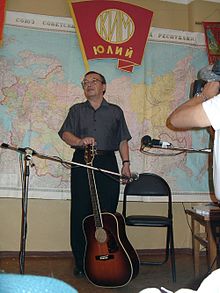Yuli Kim
| Yuliy Chersanovich Kim | |
|---|---|
 |
|
| Native name | Юлий Черсанович Ким |
| Born |
December 23, 1936 Moscow |
| Nationality | Russian |
| Citizenship |
|
| Alma mater | Moscow State Pedagogical University |
| Occupation | poet, singer-songwriter |
| Known for | his songs and human rights activism |
| Movement | dissident movement in the Soviet Union |
| Parent(s) | Kim Chersan and Nina Valentinovna Vsesvyatskaya |
| Awards | Medal Defender of a Free Russia |
Yuliy Chersanovich Kim (Russian: Ю́лий Черса́нович Ким; born 23 December 1936, Moscow) is one of Russia's foremost bards, composer, poet, songwriter for theater and films. His songs, encompassing everything from mild humor to biting political satire, appear in at least fifty Soviet movies, including Bumbarash, The Twelve Chairs, and An Ordinary Miracle, as well as the songs "The Brave Captain," "The Black Sea," "The Whale-Fish," "Cursed Lips," "Captain Bering," and "Baron Germont Went to War." Since 1998, he has been living in Israel and has made periodic tours through Russia, Europe, and the United States.
Kim was born in 1936 in Moscow to Kim Chersan, a journalist of Korean descent, and Nina Valentinovna Vsesvyatskaya, a teacher of Russian language and literature of Russian origin. His parents were victims of the Great Purge of 1937 and 1938, in which his father was executed and his mother was sentenced as a "family member of a traitor of the Motherland" to five years in a labor camp and three years of exile, so that Kim didn't see her until age 9. She was rehabilitated during the Khrushchev Thaw period in 1958, but before that, she was under the "101st kilometer" law and could not live in Moscow, so Kim's family settled in Maloyaroslavets, Kaluga Oblast. In 1951, the family moved to Turkmenistan. Kim returned to Moscow in 1954 to enter the Moscow State Pedagogical Institute.
...
Wikipedia
